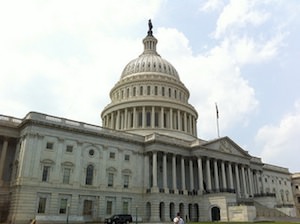Why Many in Washington Don’t Have Half a Brain
With consumers and government both spending less, businesses won’t hire more workers; they’ll fire more workers. That’s likely to happen in coming months. Anyone with half a brain should be able to understand all this. But apparently many in Washington don’t have half a brain.
This post originally ran on Robert Reich’s Web page.
Can we just put aside ideology for one minute and agree that businesses hire more workers if they have more customers, and fire workers if they have fewer customers?
There are two big categories of customer: One is comprised of individual consumers. The other is government.
We tend to think of the government as a direct employer — of teachers, fire fighters, civil servants.
But government is also a major customer of the private sector. It buys school supplies, pharmaceuticals, military equipment, computers. It hires private companies to build roads and bridges, dredge ports, manage data.
One out of every five Americans works for a company whose customer is the government.
Here’s the problem: Both categories of customer are buying less.
Individual consumers are buying less because they have less take-home pay. Their wages are dropping (the median wage is 8 percent below what it was in 2000, adjusted for inflation). And their taxes have gone up. The expiration of the Social Security payroll tax cut will shrink the typical paycheck by more than $1,000 this year.
Less take-home pay is causing 45.7 percent of consumers to pull in their belts, according to a survey released Thursday by the National Retail Federation. A quarter of consumers are putting off big-ticket purchases. A third are cutting back on eating out. A fifth are spending less on groceries.
This is why January’s retail sales rose at their smallest rate in three months.
What about the other big customer — government? It used to be that when consumers spent less, government stepped into the breach and spent more in order to keep people employed. That’s what we were supposed to have learned from the Great Depression.
No longer. Government is cutting back, too. Deficit hawks and government-haters are insisting on it.
Last year, President Obama agreed to $1.5 trillion of spending cuts, which have already begun.
Unless Republicans and Democrats reach a budget agreement before next Friday, another $85 billion of spending cuts go into effect this year. They’ll begin almost immediately.
With consumers and government both spending less, businesses won’t hire more workers; they’ll fire more workers. That’s likely to happen in coming months.
Anyone with half a brain should be able to understand all this. But apparently many in Washington don’t have half a brain.
Robert B. Reich, chancellor’s professor of public policy at UC Berkeley, was secretary of labor in the Clinton administration. Time magazine named him one of the 10 most effective Cabinet secretaries of the last century. He has written 13 books, including the best-sellers “Aftershock” and “The Work of Nations.” His latest, “Beyond Outrage,” is now out in paperback. He is also a founding editor of The American Prospect magazine and chairman of Common Cause.
Your support matters…Independent journalism is under threat and overshadowed by heavily funded mainstream media.
You can help level the playing field. Become a member.
Your tax-deductible contribution keeps us digging beneath the headlines to give you thought-provoking, investigative reporting and analysis that unearths what's really happening- without compromise.
Give today to support our courageous, independent journalists.






You need to be a supporter to comment.
There are currently no responses to this article.
Be the first to respond.